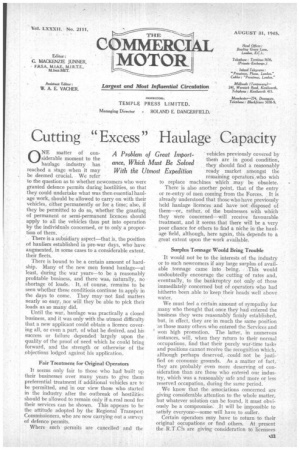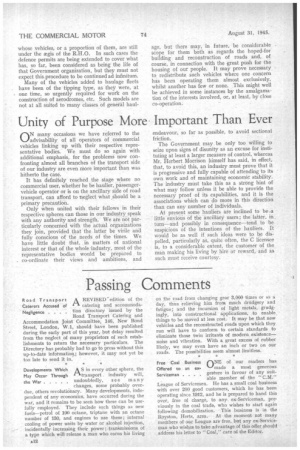Cutting "Excess" Haulage Capacity
Page 13

Page 14

If you've noticed an error in this article please click here to report it so we can fix it.
ONE matter of considerable moment to the haulage industry has reached a stage when it may be deemed crucial. We refer to the question as to whether newcomers who were granted defence permits during hostilities, so that they could undertake what was then essential haulage work, should be allowed to carry on with their vehicles, either permanently or for a time; also, if they be permitted to do so, whether the granting of permanent or semi-permanent licences should apply to all the vehicles thus put into operation by the individuals concerned, or to only a proportion of them.
There is a subsidiary aspect—that is, the position of hauliers established in pre-war days, who have augmented, in some cases to a considerable extent, their fleets.
There is bound to be a certain amount of hardship. Many of the new men found haulage—at least, during the war years—to be a reasonably profitable business, and there was, naturally, no shortage Of loads. It, of course, remains to be seen whether these conditions continue to apply in the days to come. They may not find matters nearly so easy, nor will they be able to pick their loads as so many did.
Until the war, haulage was practically a closed business, and it was only with the utmost difficulty that, a new applicant could obtain a licence covering all, or even a part, of what he desired, and his success or failure depended largely upon the quality of the proof of need which he could bring forward, and the strength or otherwise of the .objections lodged against his application.
Fair Treatment for Original Operators It seems only fair to those who had built up their businesses over many years to give them preferential treatment if additional vehicles are to be permitted, and in our view those who started in the industry after the outbreak of hostilities should be allowed to remain only if a _real need for their services can be shown. This appears to be the attitude adopted by the Regional Transport Commissioners, who are now carrying out a survey of defence permits.
Where such permits are cancelled and the them are in good condition, they should find a reasonably ready market amongst the remaining operators who wish to replace machines which may be obsolete.
There is also another point, that of the entry or re-entry of men coming from the Forces. , It is already understood that those who have previously held haulage licences and have not disposed of them—or, rather, of the businesses with which they were concerned—will receive favourable treatment, and it seems that there will be a very poor chance for others to find a niche in the haulage field, although, here again, this depends to a great extent upon the work available.
Surplus Tonnage Would Bring Trouble It would not be to the interests of the industry or to such newcomers if any large surplus of available tonnage came into being. This would undoubtedly encourage the cutting of rates and, eventually, to the bankruptcy not only of those immediately concerned but of operators who had hitherto been able to keep their heads well above water.
We must feel a certain amount of sympathy for many who thought that once they had entered the business they were reasonably firmly established, but, in effect, they are in much the same position as those many others who entered the Services and won high promotion. The latter, in numerous instances, will, when they return to their normal occupations, find that their purely war-time tasks and positions cannot receive the recognition which, although perhaps deserved, could not be justified on economic grounds. As a matter of fact, they are probably even more deserving of consideration than are those who entered our industry, which was a reasonably safe and more or less reserved occupation, during the same period.
We know that the associations concerned are giving considerable attention to the whole matter, but whatever solution can be found, it must obviously be a compromise. It will be impossible to satisfy everyone—some will have to suffer.
Certain operators may have to return to their original occupations or find others. At present the R.T.Os are giving consideration to licensees whose vehicles, or a proportion of them, are still under the gis of the R.H.O. In such cases the defence permits are being extended to cover what has, so far, been considered as being the life of that Government organization, but they must not expect this procedure to be continued ad infinitum.
Many of the vehicles added to haulage fleets have been of the tipping type, as they were, at one time, so urgently required for work on the construction of aerodromes, etc. Such models are not at all suited to many classes of general haul age, but there may, in future, be considerable scope for them both as regards the hoped-for building and reconstruction of roads and, of course, in connection with the great push for the housing of our people. It may prove necessary to redistribute such vehicles where one concern has been operating them almost exclusively, whilst another has few or none. This might well be achieved in some instances by the amalgamation of the interests involved, or, at least, by close co-operation.




















































